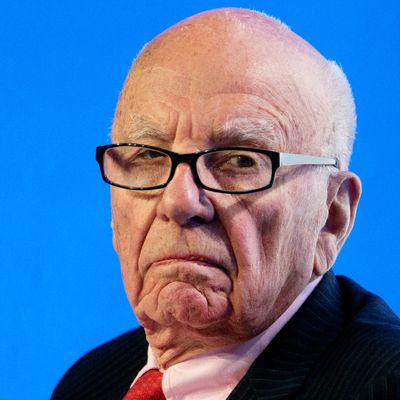
For the past two decades, Rupert Murdoch allowed Fox News chief Roger Ailes to occupy one of the most unique — and powerful — perches in American politics and media: running a right-wing political operation under the guise of a 24-hour news network. As long as the profits rolled in, Murdoch virtually never meddled in Ailes’s world — even when his own family protested. “He lets me run it, he doesn’t bother me much,” Ailes boasted of Murdoch as recently as April 2015. But that laissez-faire era seems to be over.
According to four high-placed Fox sources, Murdoch is upping his presence at Fox while Ailes has become less visible to anchors and producers, signaling a shift that marks a new chapter in the network’s history. The most visible change is that, since June, Murdoch has been attending Ailes’s daily executive meeting held on the second floor of Fox headquarters. The secretive afternoon gathering in Ailes’s conference room is attended by about a half-dozen of the network’s most senior lieutenants. It’s where some of the most sensitive decisions about running the channel are discussed.
Murdoch has so far been a quiet observer, but his presence at the table is striking to Fox executives. Some interpret it as a sign that the 84-year-old, newly engaged Australian mogul is preparing for a future where the 75-year-old Ailes is no longer in the picture. It’s one of the most significant decisions Wall Street will be watching: Fox is valued at north of $15 billion and generates as much as 30 percent of Murdoch’s profits. “He wants a smooth handover,” one executive told me. Right now the two leading internal candidates are Michael Clemente, who’s in charge of news, and Bill Shine, who oversees Fox Business. The rivalry between the two, as I’ve reported in the past, is fierce to the point that the two rarely speak. On Thursday night, Shine will have a chance to showcase his producing skills when Fox Business hosts the GOP debate in South Carolina.
The succession question seems to be taking on new urgency after three sources say Ailes threatened to quit this summer when Murdoch elevated his sons, Lachlan and James, to take over the media empire. After their promotions were announced, Ailes put out his own statement on Fox Business that declared he would continue reporting directly to Rupert. Eventually, an uneasy accord was reached: Rupert gave Ailes a new contract, but Fox issued a follow-up press release clarifying that Ailes would report to Rupert as well as Lachlan and James. Since that stinging public rebuke, executives have noticed Rupert around the Fox News hallways. “He’s marking his territory,” one person briefed on the matter told me. “There’s a little bit of a pissing match with Roger. Rupert is basically saying, ‘I know you built this place, but I own it and I’ll remind you of that by coming here.’”
A spokesperson for 21st Century Fox declined to comment. Ailes’s spokesperson, Irena Briganti, did not respond.
Meanwhile, Fox hosts and producers tell me Ailes has been a somewhat diminished force at the network. In 2014, he took an extended leave of absence after a health scare. He still has trouble walking and rarely ventures out of his executive suite. A friend who ran into Ailes in Palm Beach over the holidays remarked that he was using a walker. “He seems detached and removed,” one Fox personality tells me. “He’s not around as much,” says another friend of Ailes. “He doesn’t have as many meetings with talent.”
What this means politically is that during this year’s fractious Republican primary, Fox isn’t functioning like the disciplined campaign it’s historically been. “There’s no directive on anything,” one anchor told me. “There used to be directives on everything, and now there’s not, which is kind of nice.” By far, the clearest sign of this leadership vacuum is the network’s erratic handling of Trump in the wake of his feud with Megyn Kelly. “There is no Trump strategy,” the source explained.
Now more than ever Fox needs a firm hand on the wheel. In many ways, the channel faces the same rebellion from the grassroots that’s cleaving the GOP. “I can tell you, my base is fed up with Fox,” conservative commentator Michelle Malkin told me. Malkin, who quit Fox as a contributor, actually goes after Murdoch for supporting immigration reform in her new book Sold Out (she calls him a “treacherous bedfellow”). Rush Limbaugh, whom Ailes first put on television in the early ’90s, has said he “no longer watches cable news.” A Limbaugh friend told me the dig was made explicitly about Fox.
Several other prominent conservatives I’ve spoken with grumble that Murdoch is pushing Fox to be openly hostile to Trump and Ted Cruz at the same time the channel boosts Establishment candidates, most prominently Marco Rubio. “I’ve joked to people that they’ll be doing a segment about kumquats in China and somehow they’ll mention Rubio,” one Cruz ally told me. Another conservative activist pointed out that Fox gave Rubio the first interview opportunity following Obama’s Oval Office address on ISIS last month. Murdoch’s Wall Street Journal, it should also be noted, has been one of the most aggressive Trump and Cruz critics.
So far, the kvetching among conservatives has yet to become a business concern for Murdoch. But as he weighs Fox’s future — with or without Ailes — Murdoch must consider the risk that the backlash poses to his network. Fox revolutionized cable news by offering a conservative alternative to CNN and the broadcast networks, and the long-term danger is that Fox’s audience starts to watch it grudgingly, hoping for an alternative. “After the big brouhaha with Trump, there was all the apocalyptic talk of the ratings cratering. But there’s still nowhere else on TV to go,” Malkin says. “There’s a big opportunity. These people are sick and tired of seeing Lindsey Graham all over Fox.”





























